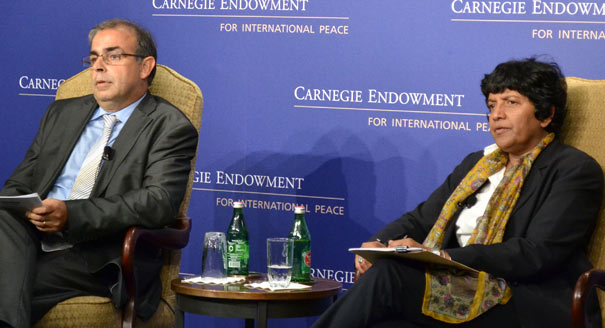Registration
You will receive an email confirming your registration.
IMGXYZ3936IMGZYXWith the March 2013 elections approaching, the Pakistani government has an opportunity to ensure a smooth transfer of power to the next elected government for the first time in the country’s history. Obstacles such as a lack of security, including in the tribal borderlands troubled by militant violence, and the need to ensure the participation of more than 84 million voters threaten to derail the transition. Pakistan’s international partners, particularly the United States, will have a crucial role in supporting an uninterrupted democratic process.
Samina Ahmed of Crisis Group’s South Asia project discussed ideas from her new report. Carnegie’s South Asia program director Frederic Grare moderated.
Significant Opportunities
- Procedural Reforms: With the passage of the Eighteenth Amendment to Pakistan’s Constitution in April 2010, the country’s two major political parties were able to come together to strengthen the institutional authority and autonomy of the Election Commission of Pakistan (ECP), Ahmed explained. They instituted a number of reforms, including eliminating the president’s ability to appoint the Chief Election Commissioner.
- Cleaner Electoral Rolls: The ECP has been engaged in an effort to cleanse the electoral rolls of the millions of fraudulent entries inherited from President-General Pervez Musharraf’s military regime, Ahmed continued. This project is matched with innovative efforts to communicate with voters, including via SMS messaging. Preparing the rolls remains an ongoing project, with some estimates suggesting that 15,000 citizens are registering under the new system every day.
- Planning for Caretaking: Ahmed asserted that it is critical for the two major parties to reach consensus on a plan for a caretaker government during the transition. However, in the event that they cannot, the constitutional reforms have put the responsibility for appointing a caretaker government in the hands of the ECP. According to Ahmed, this measure reduces the ability of the military to appoint its own caretakers under the guise of maintaining stable governance.
Logistical Challenges
- Enormous Scale: Running polls for 84 million potential voters would be trying under the best of circumstances, and the infrastructural deficiencies in Pakistan are a real threat to the integrity of this process, Ahmed said. She explained that the parties need to work together to ensure that the ECP has the resources it needs to overcome these challenges.
- Where to vote? The ECP has yet to designate permanent polling places—a step that should be taken as soon as possible, Ahmed asserted. Following the Supreme Court’s ban on the parties themselves providing transportation, it remains unclear how voters will get to the polls, especially in Pakistan’s rural areas.
Political Challenges
- Judicial Intervention: In Ahmed’s view, the increasingly activist court of Chief Justice Iftikhar Chaudry has already taken steps to limit the campaign activities of political parties and raised concerns about the continuity of government with its recent dismissal of Prime Minister Yousaf Raza Gilani. She argued that the court must respect the fundamentally political nature of the electoral process and leave related decisions up to the parliament and the ECP.
- Military Shadow: The military’s thought process towards the elections remains relatively opaque, with observers wondering whether the armed forces will attempt a “mini-coup” of the sort that led to Musharraf’s takeover in the 1990s, perhaps with the support of the judiciary, Ahmed added. The political parties can minimize the threat of such a takeover by cooperating with each other to ensure that the electoral process itself is as credible as possible.
- Ethnic Conflict: Ongoing ethnic and sectarian conflict in areas such as Baluchistan and urban Sindh may depress turnout and entrench the feeling of disenfranchisement held by certain groups, Ahmed warned. The government and the military must enforce existing laws to protect the security and freedoms of ethnic and religious minorities to reduce the problem of political alienation.
View from Abroad
- Afghanistan: According to Ahmed, these elections hold the promise of a more peaceful relationship with Kabul going forward because both major political parties, the Pakistan People’s Party and the Pakistani Muslim League-Nawaz, favor a less violent future with their neighbor to the west.
- America: The United States has a history of supporting the military’s intervention in domestic politics in Pakistan, on the belief that the military provides the best chance of backing U.S. anti-terrorism efforts, Ahmed said. She warned that a return to this belief in 2013 would create more space for Pakistan’s military to tighten its relations with insurgent groups that the United States is fighting in Afghanistan, such as the Afghan Taliban and the Haqqani network. She concluded that U.S. interests are best served by signaling strong support for the civilian transfer of power.
